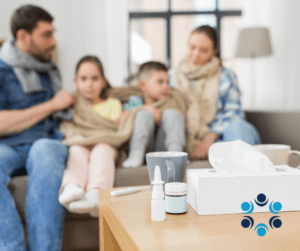
Deciding whether or not to keep your child off school, nursery or playgroup when they appear unwell can be tricky. Here’s our quick guide to common child illnesses and the best practice to take with attending school.
Our advice can be followed if your child does not have coronavirus symptoms or if they have tested negative and do not have coronavirus.
Coronavirus (COVID-19)
If your child has symptoms of COVID-19 you should try to keep them at home and avoid contact with other people.
Coughs and colds
Sending your child to school with a minor cough or common cold is fine. But should they have a fever, it’s best to keep them off school until the fever goes. It’s important to throw away any used tissues and encourage your child to wash their hands regularly.
High Temperatures
If your child has a high temperature, keep them off school until their temperature goes.
Chickenpox
If your child has chickenpox, it’s important to keep them off school until the spots have crusted over. This can take about 5 days or so after the spots first appear.
Cold sore
Your child is fine to attend school with a cold sore. Try to encourage your child not to touch the blister or kiss anyone whilst they have a cold sore. Avoid sharing things like cups and towels.
Conjunctivitis
If your child has conjunctivitis, they do not need to stay off school. You can receive advice from your local pharmacist. It’s best to encourage your child to wash their hands regularly and not to rub their eyes.
Ear infection
If your child is suffering with an ear infection and has a high temperature or a severe earache, it’s best to keep them off school until they feel better or until their high temperature goes away.
Hand, foot and mouth disease
If your child develops hand, foot and mouth disease but they seem well enough to attend school, then they can. However, it’s important to encourage your child to wash their hands regularly and throw away used tissues as soon as possible.
Nits and head lice
Your child is fine to attend school with head lice. You can treat nits and head lice without seeing your GP, click here for more information.
Impetigo
A child with impetigo will need treatment from a GP, often with antibiotics. Keep your child off school until the sores have crusted over and healed. It’s good practice for your child to wash their hands and not share things like cups or towels with other children at school or nursery.
Ringworm
If your child has ringworm, you can visit your local pharmacist for advice. However, if the ringworm is on your child’s scalp, you should see your GP. Once your child has started treatment, they can attend school.
Scarlet fever
A child with scarlet fever will need treatment with antibiotics from your GP or they could be infectious for 2-3 weeks. Your child can attend school 24 hours after starting antibiotics.
Slapped cheek syndrome (fifth disease)
Once the rash appears with slapped cheek syndrome, your child is no longer infectious and therefore can attend school. If you suspect your child has slapped cheek syndrome, see your GP and inform the school as soon as possible if your child is diagnosed with it.
Sore throat
Your child is fine to attend school if they have a sore throat, however, if they have a high temperature, they should stay off school until the temperature goes away. A high temperature and sore throat could be symptoms of tonsillitis.
Threadworms
Your child can attend school with threadworms. You can speak to your local pharmacist for advice on treatment.
Vomiting and diarrhoea
A child with diarrhoea and/or vomiting should be kept home from school for 48 hours after their symptoms have gone.
